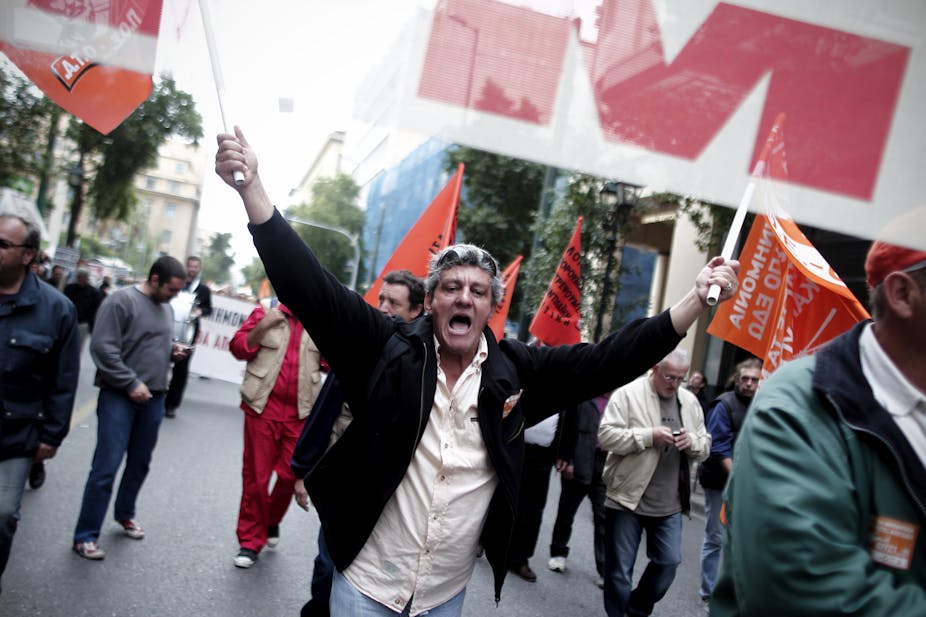The latest round of talks between Greek ministers and the financial institutions managing the largest loan a country has ever taken have just ended in Paris. It might seem odd that the latest talks to tackle Greece’s debt crisis are taking place outside of the country in question. In reality, though, it simply confirms a slow subjugation of the Greek government which we have seen since the financial crisis hit.
The three main explanations that are given for the choice of location being Paris are not particularly convincing, but they highlight the economic and political reality in Greece right now.
Fears of public protest?
The idea that holding the bailout review in Athens would spark public protest is one idea put forward for the move. But this did not stop previous meetings happening in Athens. And it is not as if the police are avoiding to crack down on anti-austerity protesters – the violence against them has been unprecedented since the signing of the loan agreement.
Even protest movements that initially do not seem to be related with anti-austerity, for example local villagers opposed to the construction of a landfill in Kerateaor goldmines in Chalkidiki, are treated by the government as huge risks to public order. And, the state has taken the post-2009 crisis as an opportunity to clamp down on any potential resistance such as the squatting movement in Athens and beyond.
The far Right para-state apparatus has also been mobilised in order to terrorise any social movements during the years of crisis. Eventually Antonis Samaras’ government was forced by large anti-fascist protests to deal with the main far Right organisation Golden Dawn. But the recent leak of a video showing the secretary of the Greek cabinet telling a leading Golden Dawn MP that this was only a political manoeuvre for the sake of votes, shows a worrying disregard for Greece’s real political and economic problems.
Avoiding humiliation?
Another explanation for transferring the talks outside of Greece is that they are humiliating for the government and its citizens. This, in spite of the fact that the years since the bailout have seen the Greek executive power obey the instructions of the EC-ECB-IMF troika to the letter.
Indeed, the list of political humiliation for Greece is endless in the shadow of the financial crisis. High on the list was the appointment of an unelected banker to prime minister.
Then there’s the fact that Greek government officials have admitted on several occasions that they merely follow the instructions of the troika. For example, the former Greek finance minister Yannis Stournaras explained in an interview how his German colleague called him to tell him what he was allowed to say during his speech in the Greek parliament.
Controlling the flow of information?
A third explanation is that more austerity and taxation measures are on the agenda, so the geographical distance will provide a better control of the flow of information towards the impoverished Greek population. But this flies in the face of the fact that Samaras’ government is austerity-friendly and does not seem to care much about Greek public opinion.
For the last two years Greece has been governed almost exclusively with decrees that were designed to be emergency provisions for use in extreme cases such as war or natural disasters. Since June 2012, 25 have been issued. Hardly any of the major structural adjustment measures were approved by the normal parliamentary process.

Add to this that the prime minister is almost never presentin the Greek parliament. Since his election, Samaras has given only five parliamentary speeches, breaking previous records for poor show.
Even when the supposedly proper parliamentary practice is followed, it is undermined by those in power. For instance, in the last four years MPs have admitted that they have not read the major structural adjustment programmes before voting in support of them. Their excuse: either lack of time. After all, parts of the bills were forwarded to the Greek MPs untranslated in English, directly by the lenders.
The government just doesn’t care
The truth of why these talks took place in Paris is much more simple: the current Greek government does not really care anymore where these talks take place. For some time now they will have been aware that they are governing the country against the will of the voters’ majority.
A recent electoral survey showed an 8% difference between New Democracy, the leading party of the current governmental coalition and the main opposition party of SYRIZA, in favour of the latter. The second party of the governmental coalition, PASOK, has almost vanished electorally.
Samaras’ government is merely in place to finish the job started by the troika and the two previous Greek governments of Georgos Papandreou and the banker Loukas Papademos: to pay off the debt imposed on the country. They will do so whether they have popular support or not. They have no reason to give any illusion of dignity to the Greek people or to bother with protests anymore. They have lost the popularity game and they know it.
The result
In light of Greece’s economic situation, setting Paris as the place of the meeting is the least of the country’s problems. The real problem is that these meetings continue to prescribe more unemployment to improve the Greek economy’s competitiveness.
Meanwhile, to pay back the loans that bailed out the Greek banking sector, they instruct that taxes are increased and public assets be privatised for peanuts. Sadly, this was one more meeting overseeing the transformation of one more country into a structurally adjusted, investment-friendly destination for world capitalist enterprises to have their way.

